Religion
|
|
Orans textile fragment
Wool and bast
Egypt
Late antique
Kelsey Museum 93915 |
|
Myris: Alexandria, AD 340
When I heard the terrible news, that Myris was dead,
I went to his house, although I avoid
going to the houses of Christians,
especially during times of mourning or festivity.
I stood in the corridor. I didn’t want
to go further inside because I noticed
that the relatives of the deceased looked at me
with obvious surprise and displeasure.
They had him in a large room,
and from the corner where I stood
I could catch a glimpse of it: all precious carpets,
and vessels in silver and gold.
I stood and wept in a corner of the corridor.
And I thought how our parties and excursions
would no longer be worthwhile without Myris;
and I thought how I’d no longer see him
at our wonderfully indecent night-long sessions
enjoying himself, laughing, and reciting verses
with his perfect feel for Greek rhythm;
and I thought how I’d lost forever
his beauty, lost forever
the young man I’d worshipped so passionately.
Some old women close to me were talking with lowered voices
about the last day he lived:
the name of Christ constantly on his lips,
his hand holding a cross.
Then four Christian priests
came into the room, and said prayers
fervently, and orisons to Jesus,
or to Mary (I’m not very familiar with their religion).
We’d known, of course, that Myris was a Christian,
known it from the very start,
when he first joined our group the year before last.
But he lived exactly as we did.
|
More devoted to pleasure than all of us,
he scattered his money lavishly on amusements.
Not caring what anyone thought of him,
he threw himself eagerly into night-time scuffles
when our group happened to clash
with some rival group in the street.
He never spoke about his religion.
And once we even told him
that we’d take him with us to the Serapeion.
But—I remember now—
he didn’t seem to like this joke of ours.
And yes, now I recall two other incidents.
When we made libations to Poseidon,
he drew himself back from our circle and looked elsewhere.
And when one of us in his fervor said:
“May all of us be favored and protected
by the great, the sublime Apollo”—
Myris, unheard by the others, whispered:
“not counting me.”
The Christian priests were praying loudly
for the young man’s soul.
I noticed with how much diligence,
how much intense concern
for the forms of their religion, they were preparing
everything for the Christian funeral.
And suddenly an odd sensation
took hold of me. Indefinably I felt
as if Myris were going from me;
I felt that he, a Christian, was united
with his own people and that I was becoming
a stranger, a total stranger. I even felt
a doubt come over me: that I’d also been deceived by my passion
and had always been a stranger to him.
I rushed out of their horrible house,
rushed away before my memory of Myris
could be captured, could be perverted by their Christianity.
Trans. Edmund Keeley and Philip Sherrard |
|
|
Bronze statue of Serapis
Karanis, Egypt
Late 3rd–early 4th century AD
Kelsey Museum 10881
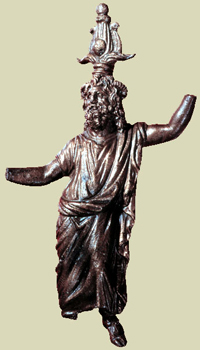 |
|
Textile fragment with cross
Egypt, late antique
3rd–4th century AD
Kelsey Museum 10881
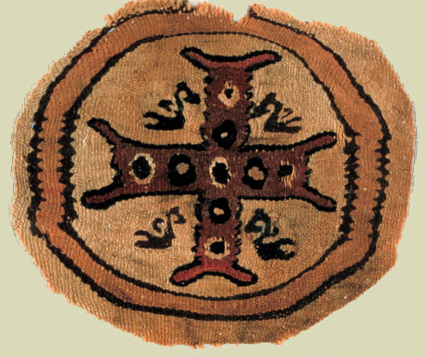 |
|
Bronze lar (household god)
Italy, 2nd–4th century AD
or modern reproduction
Kelsey Museum 29738
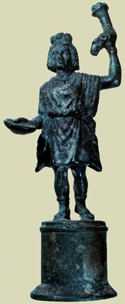 |
|
Bronze lar (household god)
Roman, 1st century AD
Kelsey Museum 1512
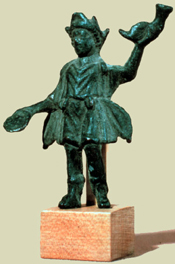 |
|
The Footsteps
Eagles of coral
adorn the ebony bed
where Nero lies fast asleep—
callous, peaceful, happy,
in the prime of his body’s strength,
in the fine vigor of youth.
But in the alabaster hall that holds
the ancient shrine of the Aenobarbi
how restless the household gods—
they tremble, the little Lares
and try to hide their insignificant bodies.
They’ve heard a terrible sound,
a deadly sound coming up the stairs,
iron footsteps that shake the staircase;
and now faint with fear, the miserable Lares
scramble to the back of the shrine,
shoving each other and stumbling,
one little god falling over another,
because they know what kind of sound that is,
know by now the footsteps of the Furies.
Trans. Edmund Keeley and Philip Sherrard
|
|
|
(top) Green jasper amulet
Egypt
Roman, AD 100–500
Kelsey Museum 26054
(bottom) Hematite amulet
Egypt
Roman, AD 100–500
Kelsey Museum 26059
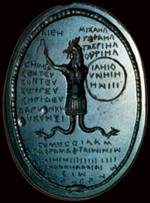 |
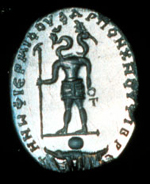 |
|
Hematite amulet with
modern gold setting
(top) Obverse,
(bottom) reverse
Egypt
Roman, AD 100–500
Kelsey Museum 26109
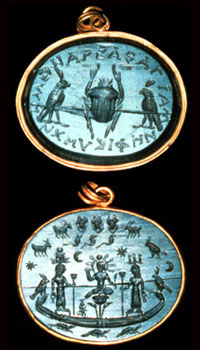 |
|
Following the Recipe of Ancient
Greco-Syrian Magicians
Said an aesthete: “What distillation from magic herbs
can I find—what distillation, following the recipe
of ancient Greco-Syrian magicians—
that will bring back to me for one day (if its power
doesn’t last longer) or even for a few hours,
my twenty-third year,
bring back to me my friend of twenty-two,
his beauty, his love.
What distillation, following the recipe
of ancient Greco-Syrian magicians, can be found
to bring back also—as part of this return of things past—
even the little room we shared.”
Trans. Edmund Keeley and Philip Sherrard
|
|
|
Of the Jews (AD 50)
Painter and poet, runner and discus-thrower,
beautiful as Endymion: Ianthis, son of Antony.
From a family on friendly terms with the Synagogue.
“My most valuable days are those
when I give up the pursuit of sensuous beauty,
when I desert the elegant and severe cult of Hellenism,
with its over-riding devotion
to perfectly shaped, corruptible white limbs,
and become the man I would want to remain forever:
son of the Jews, the holy Jews.”
A most fervent declaration on his part: “. . . to remain forever
a son of the Jews, the holy Jews.”
But he did not remain anything of the kind.
The Hedonism and Art of Alexandria
kept him as their dedicated son.
Trans. Edmund Keeley and Philip Sherrard
|
|
|
Inscriptions from the Jewish catacombs
Parker photo collection, ca. 1870–1880
Kelsey Museum 2000.1.776 |
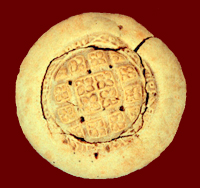
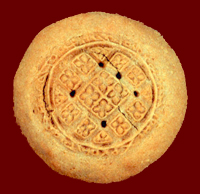 |
Eucharistic cakes
Egypt
Kelsey Museum 1971.2.150 a and b
Kleitos’ Illness
Kleitos, a likeable young man,
about twenty-three years old—
with an excellent upbringing, a rare knowledge of Greek—
is seriously ill. He caught the fever
that reaped a harvest this year in Alexandria.
The fever found him already worn out morally
by the pain of knowing that his friend, a young actor,
had stopped loving and wanting him.
He’s seriously ill, and his parents are terribly worried.
An old servant who brought him up
is also full of fear for Kleitos’ life;
and in her terrible anxiety
she remembers an idol she used to worship
when she was young, before she came there as a maid,
to the house of distinguished Christians, and turned Christian herself.
She secretly brings some votive cake, some wine and honey,
and places them before the idol. She chants whatever phrases
she remembers from old prayers: odds and ends. The ninny
doesn’t realize that the black demon couldn’t care less
whether a Christian gets well or not.
Trans. Edmund Keeley and Philip Sherrard
|
|
|
|
|